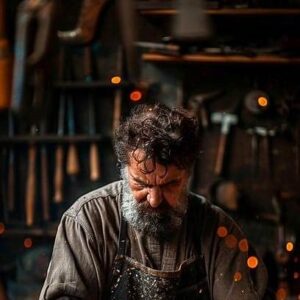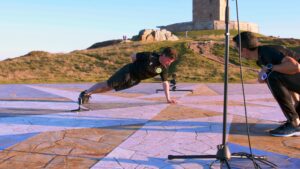
The Engineer Who Asked Why
From an early age, I was captivated by the mysteries of energy and the hidden mechanisms behind how things work. As a child, I would often dismantle electro-mechanical toys, radios, and home appliances—not out of mischief, but out of a deep and intuitive curiosity. This fascination eventually led me to pursue Industrial Engineering at the University of Vigo in Spain.

things work with simple tools in hand
But unlike many of my peers, I never saw engineering as a stepping stone to a conventional professional career. Rather, I approached it as a tool—a method for pursuing the questions I had always asked myself about the relationship between nature, technology, and human values. My studies provided me with rigorous analytical skills, yet I soon sensed a gap: the frameworks I was taught operated under materialistic assumptions that rarely addressed the deeper unity I felt existed between science, technique, life, and meaning.

Among these stacks I learned structure
but wondered what lay beyond mere mechanism
That missing dimension arrived unexpectedly during a transformative period between 1999 and 2002. Personal and extra-academic experiences shattered my conceptual limitations and offered the answers my formal education could not. These events are explored semi-autobiographically in my novel The Soul of the Sea, which recounts both a spiritual awakening and the symbolic birth of the Solar Warrior figure—a presence that invaded my imagination with the force of myth, guiding my path ever since.
These revelations gave rise to the Fondo Natural project in 2003, which I developed while finishing my engineering degree. By succeeding in gaining corporate support from Obra Social Caixa Galicia, the project briefly flourished as an ambitious, multimillion-euro attempt to integrate sustainability, culture, and technology. But in 2007, it was abruptly shut down by political decisions that had little to do with its merit.
This loss was not just professional—it was existential. I had to face a crossroads: continue on a path of standard engineering employment, or risk everything to remain faithful to the synthetic spirit that had animated both my imagination and my practical work. I chose the latter.
Since then, I have applied my engineering background only in select, multidisciplinary projects that resonate with a deeper cultural or philosophical aim. This approach, akin to the spirit of karma yoga or wei wu wei (“action without action”), shaped the creation of Operative Traditions—a four-volume work that distills two decades of hands-on experience and metaphysical insight into the technical world.

Technique as living culture—every strike a lesson,
every spark a moment of meaning
Paradoxically, this path of non-attachment has yielded extraordinary outcomes: physical feats such as my Guinness World Record, and a conceptual breakthrough that challenges Newtonian physics itself. All of it began with the dismantling of a few toys—and with the refusal to let education reduce mystery to mechanism.
